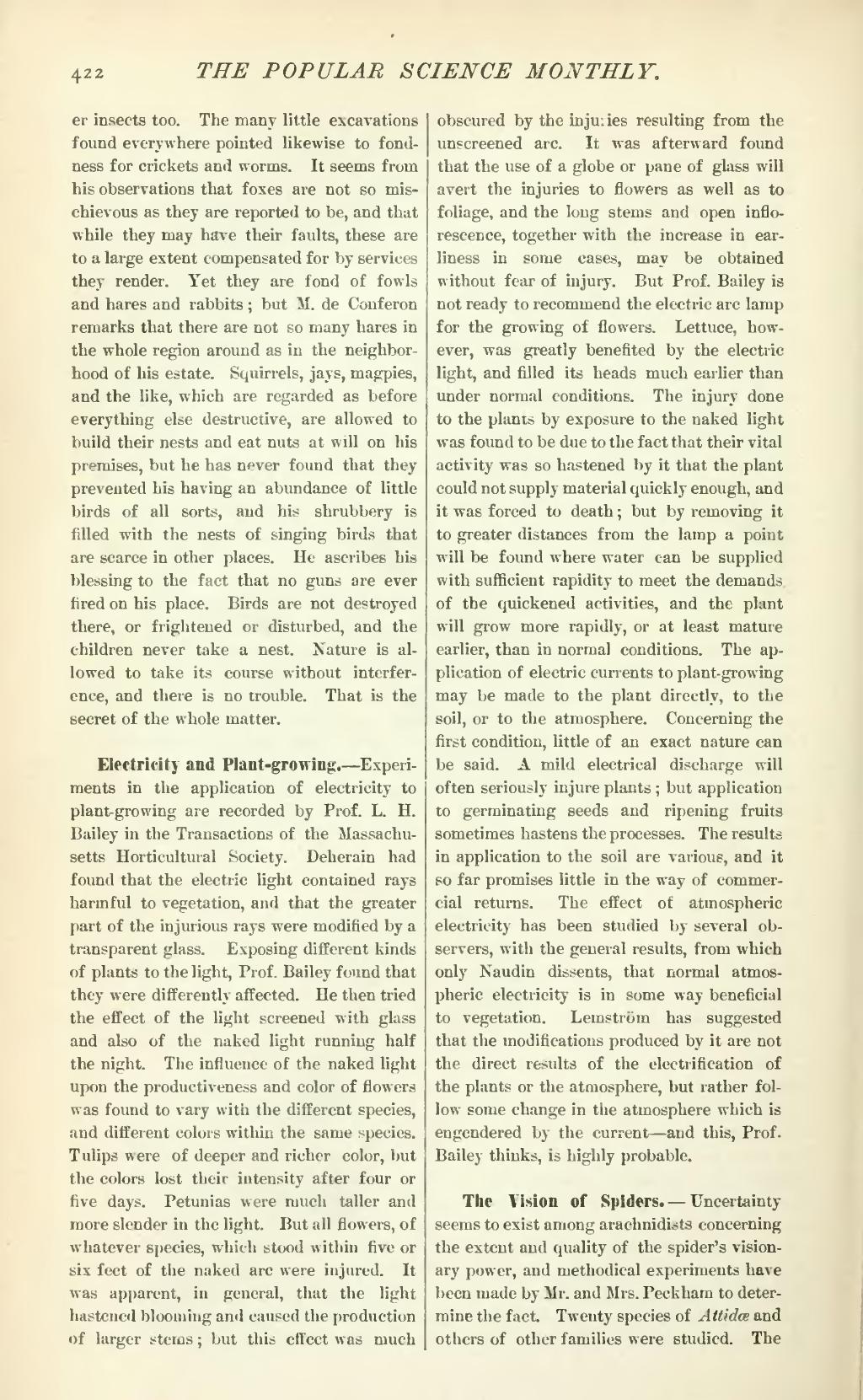er insects too. The many little excavations found everywhere pointed likewise to fondness for crickets and worms. It seems from his observations that foxes are not so mischievous as they are reported to be, and that while they may have their faults, these are to a large extent compensated for by services they render. Yet they are fond of fowls and hares and rabbits; but M. de Conferon remarks that there are not so many hares in the whole region around as in the neighborhood of his estate. Squirrels, jays, magpies, and the like, which are regarded as before everything else destructive, are allowed to build their nests and eat nuts at will on his premises, but-he has never found that they prevented his having an abundance of little birds of all sorts, and his shrubbery is filled with the nests of singing birds that are scarce in other places. He ascribes his blessing to the fact that no guns are ever fired on his place. Birds are not destroyed there, or frightened or disturbed, and the children never take a nest. Nature is allowed to take its course without interference, and there is no trouble. That is the secret of the whole matter.
Electricity and Plant-growing.—Experiments in the application of electricity to plant-growing are recorded by Prof. L. H. Bailey in the Transactions of the Massachusetts Horticultural Society. Deherain had found that the electric light contained rays harmful to vegetation, and that the greater part of the injurious rays were modified by a transparent glass. Exposing different kinds of plants to the light, Prof. Bailey found that they were differently affected. He then tried the effect of the light screened with glass and also of the naked light running half the night. The influence of the naked light upon the productiveness and color of flowers was found to vary with the different species, and different colors within the same species. Tulips were of deeper and richer color, but the colors lost their intensity after four or five days. Petunias were much taller and more slender in the light. But all flowers, of whatever species, which stood within five or six feet of the naked arc were injured. It was apparent, in general, that the light hastened blooming and caused the production of larger stems; but this effect was much obscured by the injuries resulting from the unscreened arc. It was afterward found that the use of a globe or pane of glass will avert the injuries to flowers as well as to foliage, and the long stems and open inflorescence, together with the increase in earliness in some cases, may be obtained without fear of injury. But Prof. Bailey is not ready to recommend the electric arc lamp for the growing of flowers. Lettuce, however, was greatly benefited by the electric light, and filled its heads much earlier than under normal conditions. The injury done to the plants by exposure to the naked light was found to be due to the fact that their vital activity was so hastened by it that the plant could not supply material quickly enough, and it was forced to death; but by removing it to greater distances from the lamp a point will be found where water can be supplied with sufficient rapidity to meet the demands of the quickened activities, and the plant will grow more rapidly, or at least mature earlier, than in normal conditions. The application of electric currents to plant-growing may be made to the plant directly, to the soil, or to the atmosphere. Concerning the first condition, little of an exact nature can be said. A mild electrical discharge will often seriously injure plants; but application to germinating seeds and ripening fruits sometimes hastens the processes. The results in application to the soil are various, and it so far promises little in the way of commercial returns. The effect of atmospheric electricity has been studied by several observers, with the general results, from which only Naudin dissents, that normal atmospheric electricity is in some way beneficial to vegetation. Lemstrom has suggested that the modifications produced by it are not the direct results of the electrification of the plants or the atmosphere, but rather follow some change in the atmosphere which is engendered by the current—and this, Prof. Bailey thinks, is highly probable.
The Vision of Spiders.—Uncertainty seems to exist among arachnidists concerning the extent and quality of the spider's visionary power, and methodical experiments have been made by Mr. and Mrs. Peckham to determine the fact. Twenty species of Attidce and others of other families were studied. The

